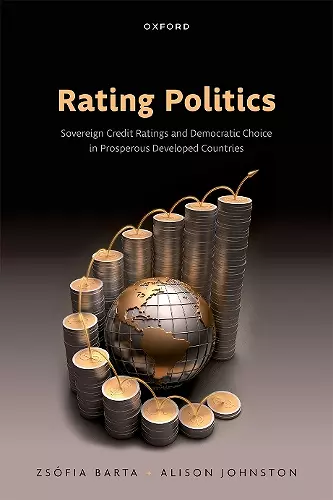Rating Politics
Sovereign Credit Ratings and Democratic Choice in Prosperous Developed Countries
Alison Johnston author Zsofia Barta author
Format:Hardback
Publisher:Oxford University Press
Published:27th Apr '23
Should be back in stock very soon

How do countries' political and policy choices affect the credit ratings they receive? Sovereign ratings influence countries' cost of funding, and observers have long worried that rating agencies - these unelected, unappointed, unaccountable, for-profit organizations - can interfere with democratic sovereignty if they assign lower ratings to certain political and policy choices. The questions of whether, how, and why ratings react to policy and politics, however, remain unexplored. Rating Politics opens the black box of sovereign ratings to uncover the logic that drives rating responses to political and policy factors. Relying on statistical analysis of rating scores, interviews with sovereign rating analysts, and a close reading of the official communications of rating agencies about their decisions, Zsófia Barta and Alison Johnston show that ratings penalize center-left governments and many (though not all) policies associated with the center-left agenda. The motivation for such penalties is not rooted in assumptions about how those political and policy features affect growth and debt servicing capacity. Instead, ratings are lower in the presence of those features because they are expected to make a country more vulnerable to market panics whenever the economy is hit by unforeseen shocks, as they signal insufficient willingness and/or ability to engage in determined austerity for the sake of reassuring markets. Since market panics and the resulting "sudden stops" of funding lead to humiliating collapses of ratings, rating agencies attempt to insure themselves against "rating failures" by pre-emptively assigning lower ratings to countries with the "wrong" political and policy mix.
Zsofia Barta and Alison Johnston have written the best book to date on the political economy of sovereign credit ratings. In Rating Politics, Barta and Johnston demonstrate that the often unintuitive logic of how rating agencies assess the credit worthiness of sovereigns creates constraints on policies, despite the fact that the agencies do not assess governments directly through lenses of either politics of policies. The role of rating agencies in sovereign credit markets is influential and at the same time poorly understood. Employing every possible methodological tool to make sense of the practices and effects of rating agencies, Barta and Johnston have made a significant, enduring contribution to our understanding of how the world economy functions. * Rawi Abdelai, Harvard Business School *
Rating Politics examines an important actor in global finance-credit ratings agencies. Although these agencies are private actors, they perform governance functions via their assessment of sovereigns' policies and political institutions. Barta and Johnston focus on how the logic of the ratings industry, and especially agencies' concern about their reputations, affects their assessments of governments. Focusing on wealthy democracies, the book uses interviews, rating agency reports, and statistical analyses to detail the ways in which rating agency practices affect the cost of sovereign finance. This book will be of interest to those who study sovereign finance, the governance of international capital markets, and the interaction between national welfare state policies and the global economy. * Layna Mosley, Princeton University *
ISBN: 9780198878179
Dimensions: 240mm x 162mm x 15mm
Weight: 472g
224 pages